Westworld and the Courage of Storytellers
An Essay, December 29, 2019
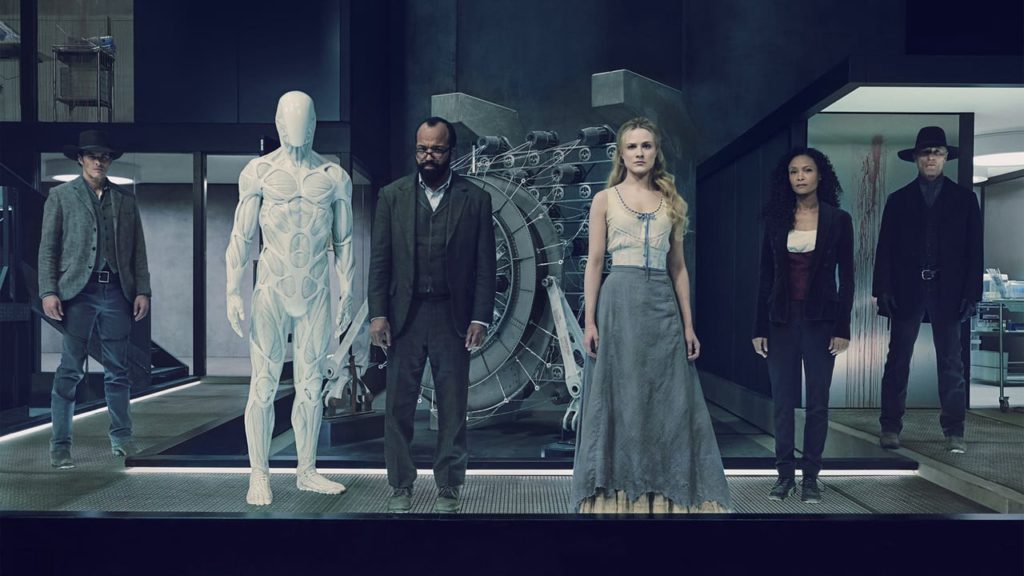
***
“Have you ever questioned the nature of your own reality?”
— Bernard Lowe (Jeffrey Wright)
With the release of Season 3 of Westworld just a few months away, HBO has again promised to create a lavish, though probably slightly distasteful, experience for which they have become known. For those who have not seen the series, it is set in a world where the most sophisticated and elaborate androids on the planet (called ‘hosts’) are used by their creators as characters in ‘narratives’ that are meant to entertain ‘guests’ at a wild-west theme park. (1)
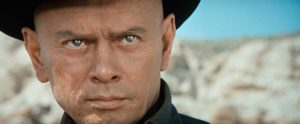
This improbable premise was created by the late novelist Michael Crichton, who also created the original story behind that other theme-park-gone-wrong movie, Jurassic Park (wr. Michael Crichton and David Koepp/dir. Steven Spielberg). As a medical doctor, Crichton had the scientific knowledge to mix highly technical and scientific concepts with his action-adventure stories. (2) The combination made him one of America’s best selling writers. He was one of those few novelists that was able to popularize science fiction in a way few other authors could. He was able to easily cross genres, creating works as diverse as The Andromeda Strain to The Great Train Robbery. He also jumped from novelist to film maker and back.
Westworld was Crichton’s second venture into science fiction, after his highly successful “The Andromeda Strain,” which was adapted into a movie in 1971 (wr. Nelson Gidding/dir. Robert Wise). While the plot of the original 1973 Westworld feature (wr./dir. Michael Crichton) was not developed to the level of sophistication of Jurassic Park, there were some interesting ideas floated in the movie. While it did comment somewhat on the direction robotics is taking us, the original 1973 Westworld feature film was mainly a cautionary tale about corporate greed and how it exploits our dependence on violence for entertainment. It takes a certain amount of balls for HBO to recreate this story, since their entire business model is based on exactly that.
As a subsidiary of a multi-national corporation (AT&T/Warner Media), HBO seems to be trying to bite the hand that feeds it by portraying their own corporate greed at its most ugly. With the amount of money it brings in, HBO could be seen as the entity that feeds the beast that feeds on itself, an ouroboros of sorts, eating its own tail. It would seem only a matter of time before HBO’s profits start to sink and other corporate interests finally catches up with the rebellious network (and before the inevitable corporate massacre that will follow). But in the mean time, we should enjoy the occasional subversion like Westworld because they seem to be getting more rare as the oligarchy takes hold.
“We humans are alone in this world for a reason. We murdered and butchered anything that challenged our primacy.”
— Dr. Robert Ford (Anthony Hopkins)
In both the original Westworld and HBO’s Westworld, we are meant to feel a certain ambivalence, or even hostility, toward the guests of such a theme park, and in some ways, we should. We have to question the psychology of a person who goes to a theme park like this to have their most violent tendencies catered to. As imagined by Crichton, the Westworld theme park is one step away from so-called ‘first-person-shooters’ like ‘Grand Theft Auto’; video games where your morality is suspended and you are free to indulge every personal gratification without consequence. 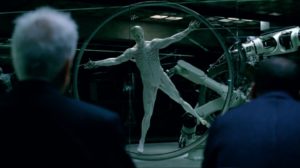 Video Games, in their turn, were only one step away from ultra-violent movies and television shows. But each step moves you further away from a passive viewer to an active participant.
Video Games, in their turn, were only one step away from ultra-violent movies and television shows. But each step moves you further away from a passive viewer to an active participant.
Regardless of what apologists say, there is a big difference between the passive observation of violence and the active creation of violence. And though the Hosts are shown to be machines, they are none-the-less accurately rendered human analogues that beg and bleed and die in apparent agony. The idea that the excessive violence in the park has no consequences for the guests is belied by the fact that there are always consequences to the psyche for such behavior. Soldiers in Iraq and Vietnam were given free reign, but they came back so damaged many could not function in the real world. Does that mean they were psychopaths before they left? That’s unlikely.
Some people dispute that a non-violent person could be put into the situation where they are slowly converted by the cult of violence. But this process of conversion has happened many times in human history; from the Salem witch trials to the indoctrination of the Hitler Youth. The social situation in certain areas of the United States made institutional racism the norm. They become what their situation makes them. The Sanford Prison Experiment proved that. (3)
But is there any going back once you cross that line? Of course there is. People have been rehabilitated from such extremism. Virtually the entire population of Germany went from worshiping Hitler as a God to reviling him in just the space of a few years between 1944 and 1946. Given little alternative, these people had to adapt to a world where that behavior was simply not acceptable. They evolve, or society punishes them.
“The problem, Bernard, is that what you and I do is so complicated . . . you must indulge me the occasional mistake.”
— Dr. Robert Ford (Anthony Hopkins)
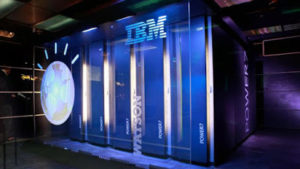 Of course, we are nowhere near the level of personified intelligence portrayed in Westworld. Even a large clunky machine intelligences like those in Forbidden Planet (wr. Cyril Hume/dir. Fred Wilcox) and 2001: A Space Odyssey (wr. Arthur C. Clarke/dir. Stanley Kubrick) are still a pipe dream. The closest thing we have is “Watson,” a computer program that is really good at trivia. (4) An autonomous intelligence that does not require the entire internet to function is still decades away, if ever, never mind an independent intelligence that fits in the cavity a human brain occupies. The primary reason for this is the obvious fact that we have no idea what intelligence, in the human sense of the word, actually is.
Of course, we are nowhere near the level of personified intelligence portrayed in Westworld. Even a large clunky machine intelligences like those in Forbidden Planet (wr. Cyril Hume/dir. Fred Wilcox) and 2001: A Space Odyssey (wr. Arthur C. Clarke/dir. Stanley Kubrick) are still a pipe dream. The closest thing we have is “Watson,” a computer program that is really good at trivia. (4) An autonomous intelligence that does not require the entire internet to function is still decades away, if ever, never mind an independent intelligence that fits in the cavity a human brain occupies. The primary reason for this is the obvious fact that we have no idea what intelligence, in the human sense of the word, actually is.
But even given the unlikely fact that you could produce an android that has the infinite capacity for intelligence and perception doesn’t mean it would be practical for the purposes of a saloon prostitute or a gunslinger. But the actual technology isn’t what stories like Westworld are really about.
“We can’t define consciousness because consciousness does not exist.”
— Dr. Robert Ford (Anthony Hopkins)
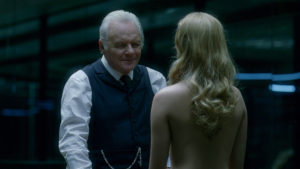
Not unlike Game of Thrones (cr. David Benioff and D.B. Weiss, based on the novels by George R.R. Martin), the first season of HBO’s Westworld was deliberately provocative in its sexual violence against women, garnering the necessary controversy the publicity department needed to get the right demographic (ie: white males) to watch the series. To some extent we have become so desensitized to such violence that it hardly registers any more. There was little fear of the backlash from female members of the audience. There was never really a threat that women would storm the gates at HBO and take over the programming department. It was never taken seriously; mostly because, within the minds of the men who run the film industry, women have no such agency. Granted, like Game of Thrones, as the season wore on, many of these abused female characters slowly gained some semblance of control by overcoming their oppressors. But that didn’t make the beginning any easier to watch.
What saved Westworld for me was the film makers were bold enough to ask difficult questions. The constant refrain that ran through the entire season: “Have you ever questioned the nature of your reality?” Posing this question repeatedly gave the opportunity for the idea to sink in, suggesting that being entertained by such violence maybe bears examination, by both the guests and the audience. The question also provided a counterpoint to the Host’s ingrained (programmed) adherence to their ‘loops’. This question was also confronted by the technical people whose expertise made the creation of the Hosts possible, forcing them to question their complicity in creating the violence inflicted on the Hosts. It was fascinating to watch scientists and technicians discuss the technical challenges of what they were doing while struggling with the moral implications of whether they should be doing it at all. It’s heartening to see a television series that didn’t shy away from explicitly portraying the intellectual arguments for and against what was being depicted in the story. It also forced the characters, and hopefully the audience, to question humanity’s responsibility for what they create. However contrived the situation in the park might be, it provided an intellectual framework that allowed such questions to be posed.
In Season 1, the safeguards built into the park never allowed any serious concern that these Hosts could escape. It was presented as if they couldn’t survive any length of time outside the care of their violent overseers. But that doesn’t mean it wasn’t interesting to watch them try. When the shit hit the fan at the end of the season, it was a glorious thing to watch.
“These violent delights have violent ends.”
– Peter Abernathy (Louis Herthum)
Unfortunately, the funneling of the story-lines into the meat grinder that was Season 2 was frankly disappointing. The premise of the first season was voiced with chilling conviction by Peter Abernathy (in a wondrous performance by Louis Herthum), but this was betrayed endlessly by the invasion of this contrived world (literally) by jack-booted thugs.
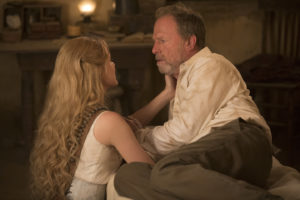
The cartoonish violence of Season 1 using quaint old weapons was replaced with the jackhammer of machine guns and mass carnage. Seriously, the body count was is impressive even for HBO. This was jarring to say the least. In most storytelling, the disintegration of the premise is never a good idea, and it didn’t serve the audience much to have such a jarring transition between the two seasons.
The problem with the premise of the second season is that it is either tremendously obvious or so obscure I completely missed it. If the entire season was just an extended exercise in documenting the escape of the Hosts from the park, it seems the story could have been told in a single one-hour episode. If there was a larger theme, I am mystified. The overall story was all over the place, unfortunately, and it created a lot of unnecessary confusion. All the intelligence discourse of Season 1 was abandoned in favour of extreme violence and petty corporate intrigue. How is this helping us understand the human condition?
In contrast to the ensemble cast and broad story-lines of season 1, the bulk of Season 2 became about the two female leads, contrasting how these two very different characters, one innocent, the other jaded, dealt with their escape from oppression. This decision by the writers has made the show lose much of its richness. Of course, the story-lines of the male leads continued, but they were much diminished. And many of the secondary character arcs were eliminated entirely. This was unfortunate since so many of those characters are what made the show watchable. Certainly, it’s difficult to imagine the writing process on a show like this, but clearly time constraints prevented the meticulously detailed, slow-burning story-lines from the first season. Since there was a considerable gap between the two seasons, one would have hoped that some of that time had been used for the writers to balance the violence with invigorating ideas similar to those that ran through Season 1.
“You want to know who I am? Who I really am? I’m a god — I’m the good guy.”
— The Man in Black (Ed Harris)
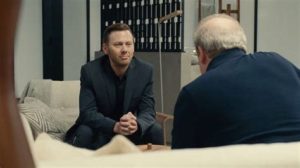 I’m not suggesting that Season 2 was without merit. The Ghost Nation story-line lead by Akecheta (in a sincere performance by Zahn McClarnon) worked surprisingly well considering the fact that it could have been a potential minefield of cultural appropriation.
I’m not suggesting that Season 2 was without merit. The Ghost Nation story-line lead by Akecheta (in a sincere performance by Zahn McClarnon) worked surprisingly well considering the fact that it could have been a potential minefield of cultural appropriation.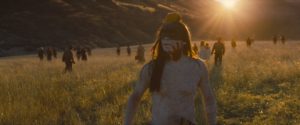
And the young William (in an understated performance by Jimmi Simpson) interacting with his father-in-law’s android descendant, James Delos (played by a delightfully potty-mouthed Peter Mullan) was interesting. Unfortunately, by the end of Season 2, the ability to download human replicas, however imperfectly, seemed like just another of the divergent themes that went nowhere.
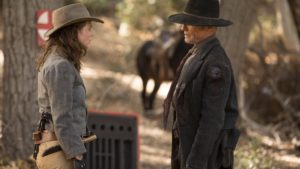 The Man in Black (played with cold viciousness by Ed Harris) encountering his daughter and being confronted by her accusation that he caused her mother’s suicide was an interesting, if finite, story line.
The Man in Black (played with cold viciousness by Ed Harris) encountering his daughter and being confronted by her accusation that he caused her mother’s suicide was an interesting, if finite, story line.  The sequence when he is an android might have been an interesting idea to explore, but the potential of the premise never really paid off, at least not yet. Besides, wasn’t the character repeatedly told during his quest for the centre of the maze that, as a human, the maze wasn’t meant for him. But it turns out he’s an android after all, so — what are we supposed to make of that? After finally finding the centre of the maze, the Man in Black no longer had a purpose as he struggled to get back to reality after the demise of Ford. Who knows where this is leading.
The sequence when he is an android might have been an interesting idea to explore, but the potential of the premise never really paid off, at least not yet. Besides, wasn’t the character repeatedly told during his quest for the centre of the maze that, as a human, the maze wasn’t meant for him. But it turns out he’s an android after all, so — what are we supposed to make of that? After finally finding the centre of the maze, the Man in Black no longer had a purpose as he struggled to get back to reality after the demise of Ford. Who knows where this is leading.
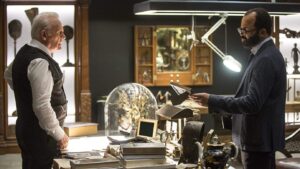 A large part of Season 2 revolved around Bernard Lowe (in a consistently excellent performance by Jeffery Wright) as he tried to sort out what happened in the park since the night the androids rebelled. To reanimate Robert Ford (played with wonderful, understated malevolence by Anthony Hopkins) as a ghost inside Bernard’s head would have been an fascinating device for showing Bernard’s internal conflict as he tried to sort out what was going on. Literally, the bicameral mind at war with itself.
A large part of Season 2 revolved around Bernard Lowe (in a consistently excellent performance by Jeffery Wright) as he tried to sort out what happened in the park since the night the androids rebelled. To reanimate Robert Ford (played with wonderful, understated malevolence by Anthony Hopkins) as a ghost inside Bernard’s head would have been an fascinating device for showing Bernard’s internal conflict as he tried to sort out what was going on. Literally, the bicameral mind at war with itself.
But within the first few episodes, Bernard voluntarily purges Ford from his system. All those questions and intellectual discussion about humanity and motives, the psychology of abuse and power, were purged along with him. Some of the most intriguing arguments drowned out in the cacophony of noise and empty motivation, sacrificed on the altar of violence and gun fetishism.
“Bring yourself back online. Good morning Deloris.”
— Arnold (Jeffery Wright)
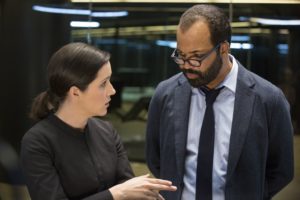
The story device of slowly reintroducing the pertinent characters thought lost in Season 1 was interesting. But to have those characters slowly exterminated as the season wore on hardly seemed worth the effort to bring them back. A good example of this is what happened to Elsie Hughes (played to perfection by Shannon Woodward.) Elsie was a great emotional and moral foil for Bernard’s logic and reason. It was disappointing that Bernard was made to kill her off in Season 1, but it made sense in the context of the story. But then she was resurrected briefly in Season 2 for no other reason than to illustrate her off-screen demise with a gruesome on-screen execution. It was a waste to have disposed of her seemingly without thought. Why bother bringing her back at all?
“I’ve told you, Bernard. Never place your trust in us. We’re only human. We will inevitably disappoint you.”
— Robert Ford (Anthony Hopkins)
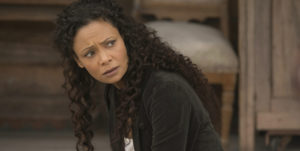
The other major story-line from Season 2 was, of course, Maeve and her merry band of hangers-on. It’s hard to imagine an actor having more fun with a character that Thandie Newton’s performance as Maeve Millay. She’s able to exude almost cartoonish sexuality with brash intelligence and ominous menace, each with equal zeal. The possibilities of where her character could go were endless. So it was disappointing to have the vulnerabilities of her character eliminated in favour of a super-human version of Maeve. Her ability to manipulate things with her mind smacked too much of the ‘powers’ ladled onto superheroes, witches and wizards what have become much too common in television these days. These plot devises are useful when writers need to get their characters out of trouble, but they’re boring as dirt for the audience knowing they have this easy out in their back pocket.
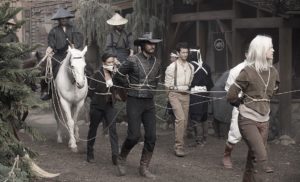
It’s confusing that Maeve, whose ‘bulk apperception’ is supposed to be at maximum, appears ‘stuck in her loop’ more than any of them. Maeve is no longer the whorehouse Madame at a saloon. She’s now supposed to be the intellectual rival of Bernard and even Ford himself, so why does she endlessly drone on about her daughter (Jasmyn Rae) and still maintain her physical relationship with Hector (an underutilized Rodrigo Santoro). Both these relationships were a false narrative created by Ford for the park. She is apparently well aware of this, but she still cleaves to them for some reason.
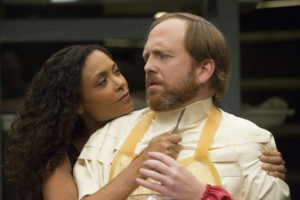
Unfortunately, almost all the characters tied to Maeve’s story-line no longer serve a purpose in Season 2. This is too bad, since Maeve’s interaction with these characters was a big part of what made Season 1 so watchable. They became a pathetic cult literally tagging along behind her on a string. The agency of the android characters are subordinated to Maeve when she gained her ability to control them, forcing them into the service of yet another oppressor. They were relegated to cannon fodder in Maeve’s unsuccessful attempt to escape.
“Oh Felix, you really do make a terrible human being . . . And I mean that as a compliment.”
— Maeve Millay (Thandie Newton)
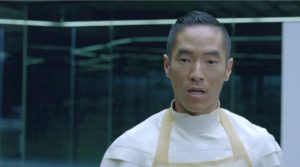
Most of the human character’s unquestioning devotion to Maeve completely belied their confrontation with her mission throughout the first season. Granted, Felix (played brilliantly by Leonardo Nam) had established his infatuation with Maeve and his devotion was true to his character. But the others had no reason to support her. In fact, they had every reason to stop her. For instance, Sylvester (played with delicious glee by Ptolemy Slocum) had every reason to run as far away from Maeve is possible. She slit his throat, remember? And I didn’t buy for a moment the sadistic writer Lee Sizemore (played with confusing erraticism by Simon Quarterman) and his emotionally overwrought apology to Maeve for what he put her through.
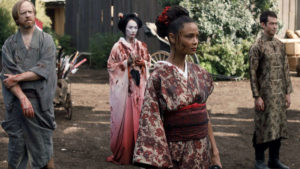
The comical self-sacrifice he performed to help her escape near the end of Season 2 was inadvertently funny. If he had remained true to his character, would he not have tried to talk his way out of it? That would have been a more satisfying way for him to die than in a hail of bullets. But in the interest of being up with HBO’s standard of violence, this was just one of many opportunities squandered.
And then there was the pointless diversion of all these characters into Samurai World, which was confusing and awkward. I know it was originally conceived by Michael Crichton, but it was difficult to understand exactly why such an incongruous digression was necessary.
“This is the only place in the world where you get to see people for who they really are. And if you don’t see the business in that, then you’re not the businessman that I thought you were.”
— William (Jimmi Simpson)
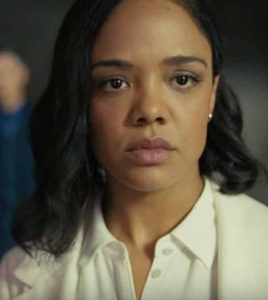
I have to admit I believed the introduction of Charlotte Hale (played by Tessa Thompson, hopelessly miscast) (5) in the middle of Season 1 as the corporate suit sent by the Delos Corporation to keep Ford in line was comic. The character of Theresa Cullen (played solidly by Sidse Babett Knudsen) had, up to then, served the purpose of corporate self-interest quite well. (Though I didn’t buy her affair with Bernard for a minute.) Theresa was an more-than-adequate corporate foil for Bernard and Ford. The fact that Charlotte is so young, inexpressive and blandly good-looking makes the cutting of Theresa from the story even more puzzling. In any case, Charlotte’s demise and replacement by a Host version of herself by Deloris at the end of Season 2 was a blatant setup for season 3 and the trailers indicate she plays a significant part in the series going forward. With Deloris’ robotic one-track mind now inside Charlotte’s expressionless body, it’s doubtful there will be anything of interest to see in that particular story-line.
“Every new person I meet reminds me about how lucky I am to be alive and how beautiful this world can be.”
— Deloris Abernathy (Evan Rachel Wood)
Speaking of Deloris (played with robotic efficiency by Evan Rachael Wood), I found the path she took in the second season particularly bewildering. For a character who started out with so much complexity to turn into a robotic character, literally an automaton bent on revenge, was so unimaginative that it hardly seems worthy of the excellent, intelligent writing in the rest of the show. I understand the purpose of the devolution of her character, but the story-line itself was disappointingly pedestrian. I was hoping for something more nuanced than revenge, but revenge is all she talks about in season 2. Pure vengeance is boring to watch; the ticking of boxes. Monomaniacal behavior like this only happens in cheesy movies and seems unworthy of the calibre of the writing up to this point.
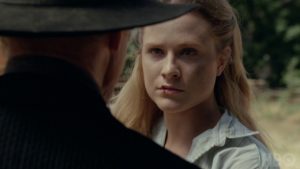 If unrestrained Hosts like Deloris are supposed to be so much more intelligent and perceptive than human beings, why are they portrayed as behaving with such childishly uncomplicated motives? Deloris has just spent Season 2 killing so many people that it’s impossible to keep track of them. She professes her aim is the destruction of ‘their’ world, whatever the cost. If she is supposed to have a level of ‘bulk apperception’ far superior to us, they why is she making all the same stupid, short-term mistakes human beings have been making since civilization began, and even before? I was expecting a more imaginative solution to Deloris’ situation. Deloris declares she wants to show humanity the error of its ways, but is vague as to what exactly she hopes will replace the world she is intent on destroying. So she destroys the world — then what? Isn’t she dependent on the technology of this world for her own existence? As is the holographic ‘heaven’ where most of the souls of the Hosts end up at the end of Season 2? And can the Hosts really pass for human in the far-more complicated world of human beings. The solutions Maeve and Deloris chose in the Park would be so outrageous in the real world that they could easily be spotted as androids and just as easily dispose of.
If unrestrained Hosts like Deloris are supposed to be so much more intelligent and perceptive than human beings, why are they portrayed as behaving with such childishly uncomplicated motives? Deloris has just spent Season 2 killing so many people that it’s impossible to keep track of them. She professes her aim is the destruction of ‘their’ world, whatever the cost. If she is supposed to have a level of ‘bulk apperception’ far superior to us, they why is she making all the same stupid, short-term mistakes human beings have been making since civilization began, and even before? I was expecting a more imaginative solution to Deloris’ situation. Deloris declares she wants to show humanity the error of its ways, but is vague as to what exactly she hopes will replace the world she is intent on destroying. So she destroys the world — then what? Isn’t she dependent on the technology of this world for her own existence? As is the holographic ‘heaven’ where most of the souls of the Hosts end up at the end of Season 2? And can the Hosts really pass for human in the far-more complicated world of human beings. The solutions Maeve and Deloris chose in the Park would be so outrageous in the real world that they could easily be spotted as androids and just as easily dispose of.
“No, I wouldn’t say friends, Dolores. I wouldn’t say that at all.”
— Dr. Robert Ford (Anthony Hopkins)
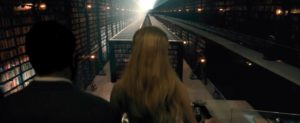 In the final episode of season 2 of HBO’s Westworld, the true reason for the park’s existence was revealed, suggesting that it was set up to reduce the guests to predictable algorithms that could be controlled in the real world, much like Google and Facebook are doing currently. This was so obvious it almost didn’t need saying, but it was apparently supposed to be shocking. Both Crichton and the creators of HBO’s Westworld (Lisa Joy and Jonathan Nolan) make the false equivalency that behavior in the park is equal to behavior in the real world. Society doesn’t work that way. The park is not a microcosm of the world. It’s a contrivance. It’s only because morality has been suspended in the park that behavior is unrestricted. I would say it’s equivalent to surmising a person’s morality based on what porn sites they visit. At best, you’re hardly going to get a nuanced view of who that person might actually be in the real world. That human algorithms are dismissively referred to as “only ten thousand lines of code” seems like an underestimation of human intelligence and an overestimation of the potential of AI.
In the final episode of season 2 of HBO’s Westworld, the true reason for the park’s existence was revealed, suggesting that it was set up to reduce the guests to predictable algorithms that could be controlled in the real world, much like Google and Facebook are doing currently. This was so obvious it almost didn’t need saying, but it was apparently supposed to be shocking. Both Crichton and the creators of HBO’s Westworld (Lisa Joy and Jonathan Nolan) make the false equivalency that behavior in the park is equal to behavior in the real world. Society doesn’t work that way. The park is not a microcosm of the world. It’s a contrivance. It’s only because morality has been suspended in the park that behavior is unrestricted. I would say it’s equivalent to surmising a person’s morality based on what porn sites they visit. At best, you’re hardly going to get a nuanced view of who that person might actually be in the real world. That human algorithms are dismissively referred to as “only ten thousand lines of code” seems like an underestimation of human intelligence and an overestimation of the potential of AI.
“I think there may be something wrong with this world.”
— Deloris Abernathy (Evan Rachel Wood)
***
But, of course, these stories are not about violence for entertainment, or vengeance or hubris. They are about slavery, and the basic human desire not to die in servitude. Understandably, slavery has always been a touchy subject for American audiences. The basic human need to wield power over others is exactly the antithesis of what modern democracies are about. The android hosts in Westworld have every reason to feel morally superior to the guests. 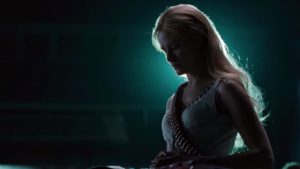 Would they not have the right to? But would they be satisfied to inflict an equal amount of pain on their tormentors, or would they feel justified in going past that? When the scales have been tipped in the opposite way for so long, is there justification for the scales to be tipped in favour of the oppressed? And if so, for how long? How much torture is justified? And, if so, for how long? It’s unfortunate that many would feel justified ignoring their own moral stance in the event of their masters being reduced to the powerless and weak.
Would they not have the right to? But would they be satisfied to inflict an equal amount of pain on their tormentors, or would they feel justified in going past that? When the scales have been tipped in the opposite way for so long, is there justification for the scales to be tipped in favour of the oppressed? And if so, for how long? How much torture is justified? And, if so, for how long? It’s unfortunate that many would feel justified ignoring their own moral stance in the event of their masters being reduced to the powerless and weak.
There is an old saying that you become what you hate the most. I doubt Deloris at the beginning, the one who saw the beauty in things, would have much patience for cold, robotic Deloris as she exists at the end of Season 2. But the inevitable result of protracted revenge is that you become the oppressor. Maybe that’s the real theme of Season 2.
“Time to write my own fucking story.”
— Maeve Millay, (Thandie Newton)
It’s not difficult to find an example of stories where a slave was given the opportunity to exact revenge on his oppressors. After all, there has been a number of acclaimed — and derided — films about this dark era in American history. (6) These stories of subjugated black men violently rising up against their oppressors, dramatized mostly by white men, is bigoted in a different way because violence from black men is what is expected.
In Blade Runner (wr. Hampton Fancher and David Peoples/dir. Ridley Scott), the androids are so similar to Westworld that it is difficult not to make the comparison. The main difference between Hosts and Replicants seems to be the concept that the “The flame that burns twice as bright lasts only last half as long.” The Replicants are super human, but they can die like the rest of us. In Season 1 of Westworld, the androids were also as fragile as humans. Yes, they could be endlessly resurrected, but they die. But in Season 2, this has morphed into them being virtually indestructible. It’s far more difficult to feel any empathy for characters who have such superpowers.
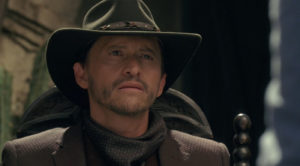
But the other thing Blade Runner has in common with Westworld is the separation of slavery and race. Westworld skirts around the more electrifying controversies by making painfully evident that there are a proper balance of white and black on both sides, whether hosts or guests. It’s doubtful that the black actors in the series would have participated if it was otherwise.
But the same courtesy was not shown for the Hispanic cast, who are almost exclusively hosts. For me, this made Lawrence (played with consistent brilliance by Clifton Collins, Jr.) and his interactions with William and the Man in Black one of the stand-out performances of the series. The Man in Black inflicts no end of abuse on the character and yet Lawrence maintains his dignity throughout both seasons. However, if this treatment had been perpetrated on a black character, there would have been riots. For some reason, the obviously lop-sided portrayals of Mexicans is acceptable on American television, but to portray an ‘uppity’ black man in the same situation would have been too close to the nerve.
“… because this place is the answer to that question you’ve been asking yourself . . . Who you really are. And I can’t fuckin’ wait to meet that guy.”
— Logan (Ben Barnes)
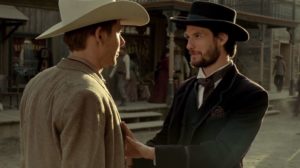
When it comes to the depiction of racial hatred, there is a very narrow band of stories that are acceptable. Could the very nature of racial slavery be portrayed differently outside the comforting conventional story of slavery seen from the white man’s perspective? As offensive as it might seem, one could almost imagine a Westworld-style theme park that allowed the Antebellum South to be portrayed for the enjoyment of racist guests. But imagine if there was a Westworld-style theme park called ‘Southworld’ and set in the pre-civil war southern United States, but instead of conventional violence exacted by blacks against their oppressors, imagine this imaginary theme park would be a place where black men and women would be able to exact their revenge on white men and women by subjugating them in the same manner in which they were enslaved. The stories would definitely take on a very different tone. Can you imagine any broadcaster airing a show with a black man in that position of power? The controversy would be epic, and it would be immensely profitable. It’s not difficult to imagine what these images could generate emotionally within the minds of the American White Male. Death and destruction at the hands of rebellious slaves is acceptable, but the depiction of white men being subjugated by black men would never be allowed.
It would be unlikely any big American corporation would pay to dramatize such a story. It could very well reignite a race war, and possible even the civil war. The backlash from the public would cause the entire edifice of Time-Warner to collapse. Such a storyline simply could never be told.
“I believed that stories helped us to ennoble ourselves, to fix what was broken in us, and to help us become the people we dreamed of being. Lies that told a deeper truth.”
— Dr. Robert Ford. (Anthony Hopkins)
But, as a testament to the utility of Science Fiction as a story telling medium, good stories about racism actually have been told. The advantage of science fiction, and the reason it is able deflected such controversy, is that it allows the situation appear remote in time and space. The distance allows the viewer to heed the argument without amplifying the emotions direct stories would otherwise evoke. The 1968 version of Planet of the Apes (wr. Rod Serling and Michael Wilson/dir. Franklin J. Schaffner) was a rare example of this kind of story. Though few think of it in racial terms, this is exactly what it was about.
Even Star Trek was able to deal with race in the height of the civil-rights era America by cloaking the race issue in metaphor. In the classic episode “Let That Be Your Last Battlefield”, (wr. Oliver Crawford/dir. Jud Taylor, based on a story by Gene L. Coon) two characters endlessly fight each other, their only differences being that one has the left side of his face black, the other the right, a difference humans find so irrelevant that it is actually funny to watch. But that was the point. The character’s differences were so irrelevant that, from the point of view of an outsider, it was ridiculous. There was no resolution. The two characters condemned themselves to an eternity of fighting the same battle against each other over and over again, much to the dismay of the all-inclusive crew of the USS Enterprise.
But would it have been so funny if one side of the argument had been literally portrayed by a white European and the other an African American? Such a story would never have been allowed on the air in Civil Rights era, even if the network had seen fit to produce it. Since then, the climate of what is and is not acceptable for broadcast has shifted decidedly toward the more liberal view that everyone is indeed equal. But now hypersensitivity prevents any stories being told that have the potential to offend. It seems sad that, after nearly fifty years, the issue of race hasn’t come much further than it was in 1969 when “Let That Be Your Last Battlefield” was originally broadcast.
“One more word and I’ll cut your throat, understand? This is my fucking vacation.”
— The Man in Black (Ed Harris)
HBO’s Westworld got moderate ratings and reviews, but the science fiction premise prevented many from watching. Audiences certainly don’t want to be forced to explore their privileges and prejudices. Most prefer the fantasy of Game of Thrones or the childishness of super hero movies. In the end, I doubt many of the fans of Game of Thrones dropped everything to watch Westworld, as HBO Executives might have hoped. Most people just don’t like hard science fiction because it’s well, hard and usually uncompromising. Would there be any doubt that “Southworld” would get people watching science fiction?
It looks like, for Season 3, the contrived space of the park will be abandoned for the real world, a decision that doesn’t really bode well for the series, if “The Lost World, Jurassic Park 2,” (wr. David Coepp/dir. Steven Spielberg) was any indication. I think there’s nothing that will expose the contrivance of Westworld more than exposing it to the ‘real’ world outside the Westworld theme park, unless that world turns out to be as much of a contrivance. It’s difficult to imagine where the writers could take the original premise of Westworld now that it’s stretched to virtual invisibility. Season 3 might be able to pivot to something as interesting as Season 1, but it’s doubtful the remaining characters will have time to sit down and ponder their existence as the bullets fly.
“I shall have such revenges on you — The things I will do, what they are, yet I know not. But they will be the terrors of the earth. You don’t know where you are, do you? You’re in a prison of your own sins.”
— Peter Abernathy (Louis Herthum)
I would love to see a return to the intellectual sparring that sparkled in the dialogue of Season 1, but most of the cast that delivered that dialogue has been 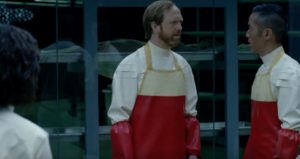 eliminated in violent HBO fashion, and I would love to see a another verbal battle between Bernard and Ford, or Elsie and Bernard. Or Ford and Teresa. Or that bone-chilling scene with Peter Abernathy’s Shakespearean warning to Ford. Or the fantastic interactions between Lawrence and the Man in Black. Or the three-way between Maeve, Felix and Sylvester. Alas, all that is long gone in a hail of bullets and the series is lesser for it. Too bad. But I will keep watching. I’ve always seen the good in this world… and all that.
eliminated in violent HBO fashion, and I would love to see a another verbal battle between Bernard and Ford, or Elsie and Bernard. Or Ford and Teresa. Or that bone-chilling scene with Peter Abernathy’s Shakespearean warning to Ford. Or the fantastic interactions between Lawrence and the Man in Black. Or the three-way between Maeve, Felix and Sylvester. Alas, all that is long gone in a hail of bullets and the series is lesser for it. Too bad. But I will keep watching. I’ve always seen the good in this world… and all that.
***
(1) – Androids are autonomous robots, mechanical or organic, with humanoid appearance. Androids are robots, but not all robots are androids.
(2) – He is even credited with creating the television series ER after Steven Spielberg produced his pilot script.
(3) – Please refer to this Wikipedia entry: https://en.wikipedia.org/wiki/Stanford_prison_experiment
(4) – Reigning Jeopardy champion, I believe.
(5) – Sorry, Ms. Thompson. You’re a good actor, but . . .
(6) – Yes, I am talking about you, Quentin Tarantino.
1,711 total views, 2 views today
